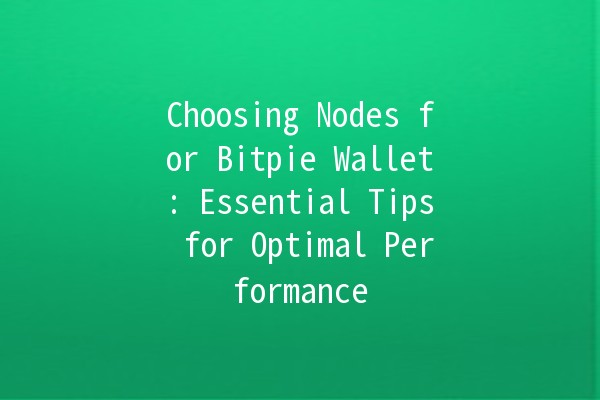
In the world of cryptocurrency, the choice of a wallet is crucial for ensuring security, access, and smooth transaction handling. One of the popular wallets available today is Bitpie Wallet, which caters to a diverse range of cryptocurrencies. However, an often overlooked aspect is the selection of nodes that your wallet utilizes. In this article, we will explore practical advice on choosing nodes for Bitpie Wallet, improve your wallet performance, and ensure a seamless user experience.
Understanding Node Selection in Bitpie Wallet
What is a Node?
In the context of cryptocurrency, a node refers to a computer that maintains a copy of the blockchain and helps validate transactions. Every node plays a critical role in the decentralized nature of cryptocurrencies by ensuring that transactions are accurately processed and recorded.
Importance of Node Selection
Choosing the right node can significantly impact your Bitpie Wallet’s performance. Several factors come into play, including the node’s geographic location, response time, reliability, and uptime. Selecting an optimal node can enhance transaction speed and reduce the risk of connectivity issues.
Tips for Selecting Nodes for Bitpie Wallet

Explanation: The performance and reliability of a node directly affect your wallet experience. Nodes that frequently go offline or take long to respond can slow down your transactions and hinder your access to funds.
Application Example: To evaluate a node’s performance, use tools or services that monitor node uptime and response times. Select nodes that are constantly online and show a low average latency. For instance, nodes hosted in your geographical region may offer better performance than those located far away.
Explanation: Accessing nodes that are spread across different geographical locations can reduce congestion and improve redundancy. This diversity ensures that if one node goes down, you can quickly connect to another.
Application Example: When setting up your Bitpie Wallet, consider enabling nodes that are in different countries or areas. This will ensure that you have multiple backup options if one node fails or experiences heavy traffic.
Explanation: Public nodes are accessible to anyone, while private nodes typically require permission or a fee. Public nodes may be less secure and prone to high usage, while private nodes can offer better security and performance.
Application Example: If security is a priority, you may choose to search for private nodes that offer encrypted connections. A private node will limit your exposure to potential risks associated with public nodes.
Explanation: Understanding network traffic around specific nodes can help you avoid nodes that are overloaded with users. Selecting nodes with lower traffic can lead to faster transaction confirmations.
Application Example: Use online tools to analyze the current traffic and load on different nodes. If a particular node shows high traffic, consider connecting to another one with lower usage during peak operating hours.
Explanation: Ensure that the nodes are compatible with the specific cryptocurrency you are managing within your Bitpie Wallet. Not all nodes support all cryptocurrencies, which could lead to transaction failures.
Application Example: When setting up your wallet, check the list of supported nodes for each cryptocurrency. Ensure that the nodes you select are fully compatible with the assets stored in your Bitpie Wallet.
Optimal Strategies to Enhance Your Bitpie Wallet Experience
In addition to node selection, consider implementing the following strategies to further boost your Bitpie Wallet performance:
Keeping your wallet updated ensures that you have the latest security patches and performance enhancements. Always check for software updates and install them promptly.
Utilize twofactor authentication (2FA), strong passwords, and never share your recovery phrases. Proper security practices prevent unauthorized access to your wallet.
Create backups of your wallet periodically. This is crucial in the event of device loss or failure. Store backups in secure, offline locations.
Stay informed about the latest developments and trends in the cryptocurrency world. This knowledge can help you make better decisions regarding your wallet usage and node selection.
Join forums and communities related to Bitpie Wallet and cryptocurrency in general. Learning from others can provide useful insights into node selection and wallet management.
Common Questions Regarding Node Selection in Bitpie Wallet
Q1: How do I find nodes for my Bitpie Wallet?
The easiest way to find nodes is through online node directories or by exploring dedicated services that list cryptocurrency nodes. Researching within cryptocurrency communities can also yield useful node recommendations.
Q2: Can I run my own node for Bitpie Wallet?
Yes, running your own node is a possibility. Setting up your own node increases your control and privacy over your transactions, but it requires technical knowledge and resources.
Q3: What happens if I choose a bad node?
Choosing a poorly performing node may result in slow transaction speeds, connection timeouts, or even the inability to complete transactions. It is crucial to monitor node performance regularly.
Q4: How can I tell if my node is slow?
You can gauge node speed by observing transaction times and the responsiveness of your wallet. Additionally, speed testing tools can give you precise metrics on your node’s performance.
Q5: Is using multiple nodes effective?
Using multiple nodes can enhance your wallet’s redundancy and performance. However, ensure that your wallet can manage connections to multiple nodes effectively to avoid confusion or conflicts.
Q6: Do I need to be technically skilled to choose nodes?
While basic understanding helps, most nodes come with userfriendly interfaces. If you encounter difficulty, various online resources can provide guidance on node selection and configuration.
By following the tips and strategies outlined in this article, users can make informed choices regarding node selection for their Bitpie Wallet. A wellchosen node can lead to improved performance, better security, and a much smoother experience in managing cryptocurrency assets.

